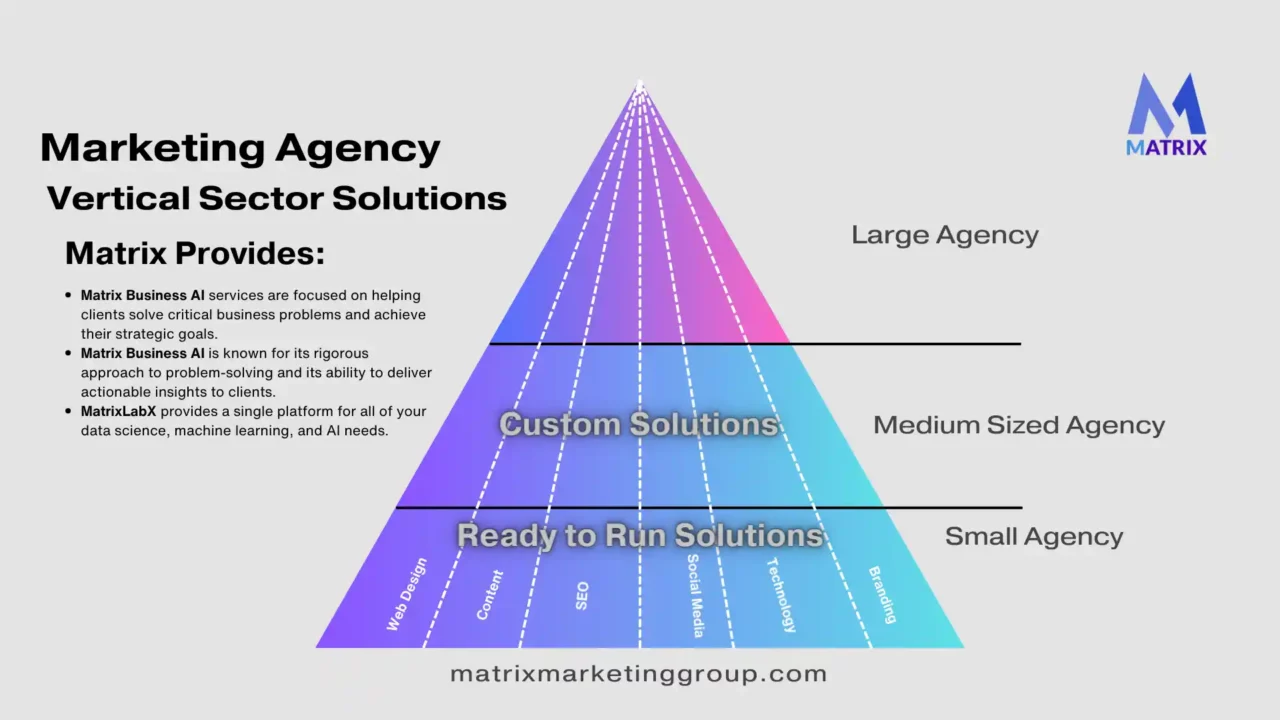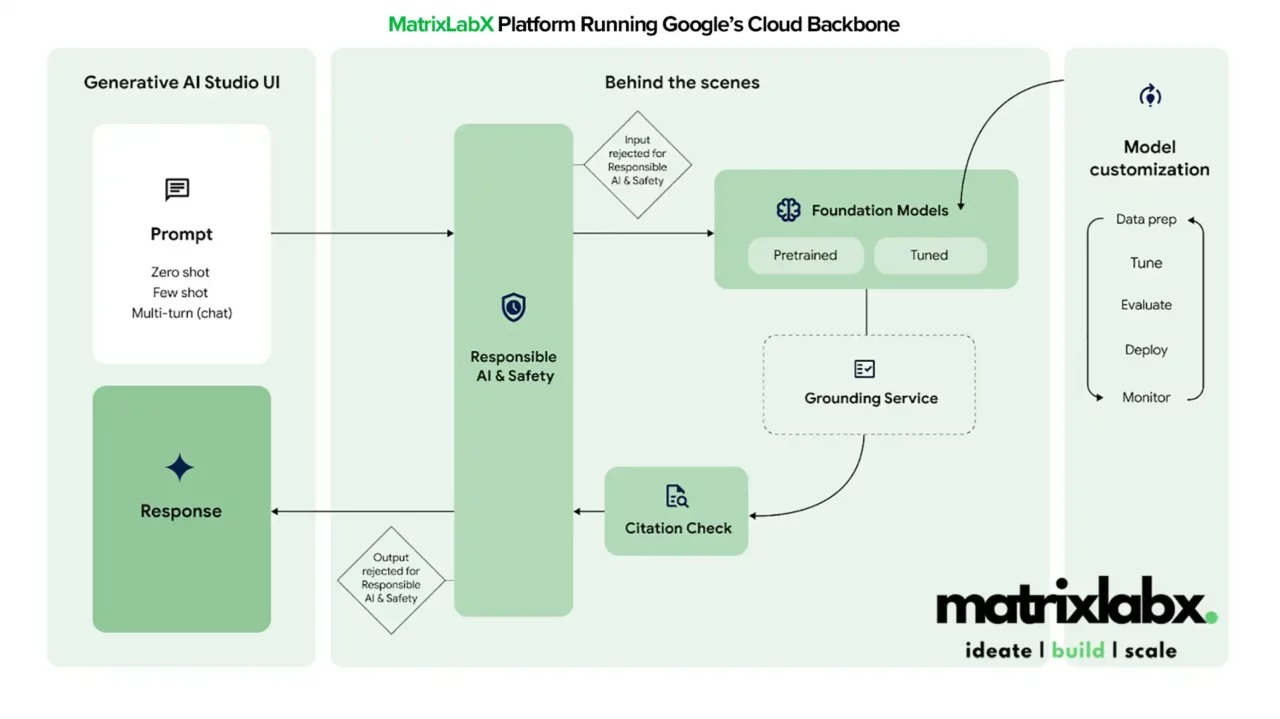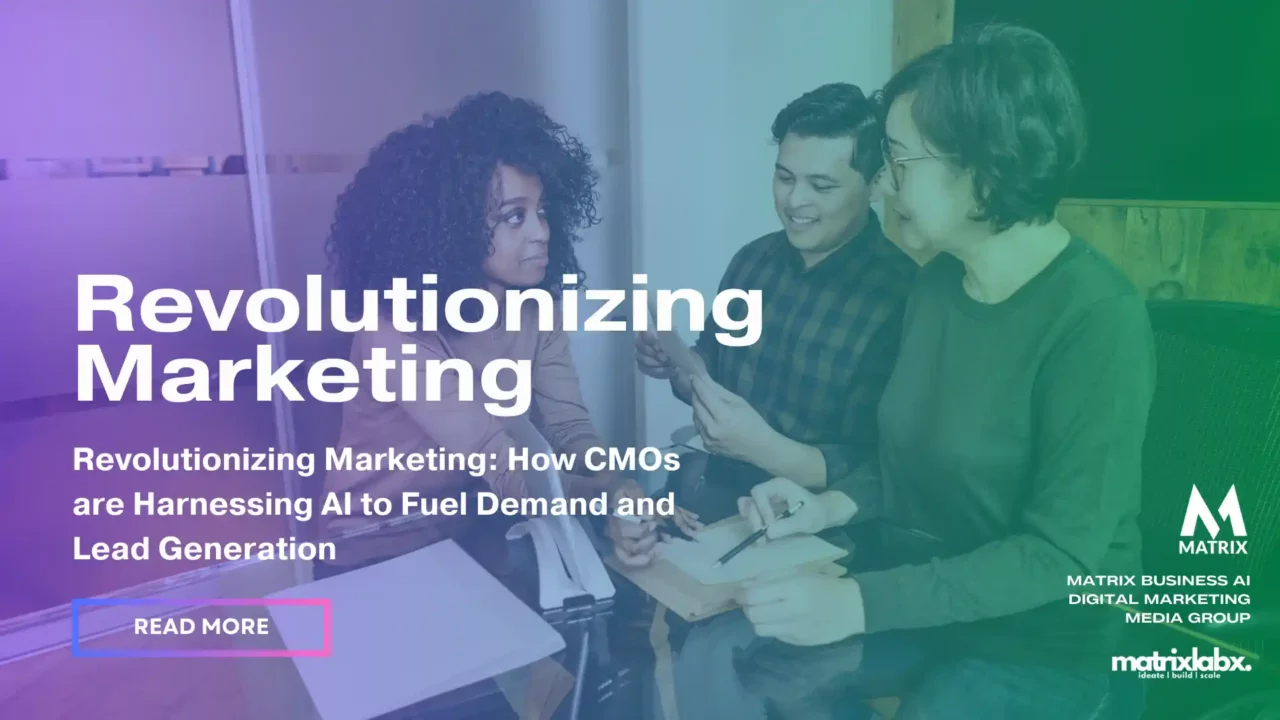AI Demand and Lead Generation: How CMOs are Revolutionizing Marketing
AI Demand and Lead Generation: How CMOs are Revolutionizing Marketing
In today’s ever-evolving digital landscape, Chief Marketing Officers (CMOs) are at the forefront of a transformative journey.
As businesses strive to stay competitive and relevant, CMOs increasingly turn to artificial intelligence (AI) as a powerful ally to drive demand and generate high-quality leads.
This dynamic synergy between human expertise and AI innovation reshapes marketing strategies, enabling CMOs to achieve unprecedented precision, personalization, and performance.
Join us as we delve into the fascinating world of AI-driven marketing, uncovering the strategies, technologies, and success stories shaping the future of demand generation and lead acquisition.
Discover how CMOs are leveraging AI to meet and exceed their marketing goals and gain insights into the strategies that are redefining the marketing landscape. Welcome to the future of marketing, where the possibilities and results are limitless. Automated Keyword Discovery: A Game Changer for SEO
Unlocking the Potential of AI in Marketing

In today’s rapidly evolving business landscape, Chief Marketing Officers (CMOs) are on the frontlines of innovation, driving transformation with cutting-edge technologies.
One such game-changer is Artificial Intelligence (AI), and CMOs are harnessing its incredible power to supercharge demand and lead generation. But what exactly makes AI the secret weapon in their arsenal?
Let’s explore how AI revolutionizes how CMOs strategize, execute, and achieve exceptional results.
The Allure of Precision and Personalization
Picture a marketing strategy that’s tailored and precise-crafted for each customer.
AI makes this a reality by analyzing vast datasets, identifying patterns, and delivering insights that allow CMOs to create highly personalized campaigns.
Gone are the days of generic messaging – AI empowers CMOs to connect with their audience on a deeper level, resonating with their needs, preferences, and aspirations.
AI: The Lead Generation Dynamo
Lead generation is the lifeblood of marketing, and AI is its turbocharger.
By automating tasks, predicting customer behavior, and optimizing campaigns in real-time, AI ensures that CMOs maximize the value of their resources. But how do CMOs integrate AI into their lead generation efforts, and what results can they expect?
Join us as we explore these questions and uncover the strategies behind AI’s lead-generation capabilities.
Real Success Stories and Strategies

While AI holds immense promise, its true potential shines through in real-world success stories. In this article, we’ll take you through inspiring case studies that showcase how CMOs from diverse industries have harnessed AI to drive demand and generate leads like never before.
Get ready to discover the strategies, tactics, and insights that have propelled these CMOs to the forefront of their fields, setting new standards for marketing excellence.
In the fast-paced marketing world, staying ahead of the curve is essential, and AI is the compass leading CMOs to uncharted territories of success.
Join us on this transformative journey as we delve into AI-driven marketing and equip you with the knowledge and strategies to revolutionize your marketing approach. Buckle up because the future of marketing is here, and AI powers it.
Title: “CMOs on the Cutting Edge: Mastering Demand and Lead Generation with AI”
The Who – Trailblazing CMOs Embracing AI
In modern marketing, CMOs are the pioneers, constantly seeking innovative ways to stay ahead of the competition.
At the forefront of this digital revolution are Chief Marketing Officers (CMOs) who have recognized the untapped potential of Artificial Intelligence (AI).
These visionary leaders understand that AI is not just a buzzword but a game-changing tool that can drive demand and lead generation to unprecedented levels.
The What – Unleashing the Power of AI in Marketing
Artificial Intelligence, once a futuristic concept, is now a tangible force reshaping marketing strategies.
CMOs are leveraging AI’s capabilities to analyze massive data sets, uncover hidden insights, and deliver personalized experiences that were once inconceivable.
With AI, CMOs are redefining the rules of engagement by transforming their marketing campaigns into precision-guided missiles, hitting their target audience with pinpoint accuracy.
Is Your Marketing Stack Leaving Money on the Table?
Your disconnected tools see pieces of the puzzle. A unified AI platform sees the whole picture. Enter your metrics to quantify the impact of switching to MatrixLabX.
Your Current Metrics
Core Business Inputs
1. Searching
2. Streaming
3. Scrolling
4. Shopping
Your Performance Transformed
| Metric | Your Platform | MatrixLabX | Monthly Lift |
|---|
Total Estimated Annual Gain
$0
from improved conversions and recovered revenue
The Where-AI’s Impact Across Industries
AI’s influence isn’t confined to a single sector; it’s a force that transcends industry boundaries.
From e-commerce giants optimizing customer journeys to healthcare providers enhancing patient engagement, AI is making a significant impact. Join us as we traverse industries to witness how CMOs adapt and adopt AI to suit their unique challenges and opportunities.
The Why – The Imperative of AI in Modern Marketing
The question lingers: Why is AI imperative for modern CMOs? The answer is multifaceted. AI doesn’t just allow marketing teams to personalize campaigns; it also automates mundane tasks, saving precious time and resources.
Additionally, AI-driven insights empower CMOs to make data-driven decisions, maximizing the efficiency and effectiveness of marketing initiatives.
Realizing the AI-Infused Future
This article will explore how CMOs from various industries navigate the dynamic landscape of AI-driven marketing.
We will delve into real-world success stories, dissecting the strategies and tactics that have catapulted these CMOs to the forefront of their fields. By the end of this journey, you’ll understand the ‘who’ and ‘what’ and also the ‘how’ and ‘why’ of CMOs driving demand and lead generation with AI.
Join us as we uncover the secrets behind AI’s role in reshaping the marketing landscape. Whether you’re a CMO, a marketing enthusiast, or simply curious about the future of marketing, this article is your guide to unlocking the immense potential of AI.
As the digital era continues to evolve, those who embrace AI will keep pace and lead the charge toward a future where marketing is smarter, more efficient, and more effective than ever. The journey starts here – let’s explore how CMOs harness AI to new game rules.
AI-Powered Financial Marketing: Transforming Demand and Lead Generation
The Challenge – Meeting the Unique Needs of Financial Firms
In the fast-paced world of financial services, staying ahead of the competition and meeting regulatory requirements is paramount.
Financial firms face the challenge of reaching their target audience and establishing trust and credibility. This is where AI is a game-changer, offering innovative solutions to drive demand and lead generation like never before.
Use Case 1: Personalized Wealth Management
Tailoring Financial Advice at Scale
One of the critical aspects of financial services is wealth management. Imagine a financial firm that can simultaneously provide personalized investment recommendations to thousands of clients.
AI makes this possible by analyzing clients’ financial histories, risk profiles, and market trends. It then tailors investment strategies, offering each client a unique and personalized wealth management experience.
By leveraging AI-powered chatbots and recommendation engines, financial firms can provide personalized engagement with clients, answer questions, offer insights, and even execute investment orders in real-time.
This enhances client satisfaction and increases assets under management (AUM) as clients trust in the firm’s ability to cater to their specific financial goals.
Use Case 2: Predictive Lead Scoring for Mortgage Lenders
Identifying High-Value Leads in a Competitive Market
Identifying high-quality leads in a competitive market is a constant challenge for mortgage lenders. AI brings predictive lead scoring to the table, analyzing a range of variables, including credit scores, income levels, and social media behavior, to identify potential borrowers with a higher likelihood of conversion.
By utilizing AI-driven lead scoring models, financial firms can prioritize their outreach efforts, focusing on leads more likely to convert into mortgage applications.
This optimizes marketing spend, resulting in faster and more efficient lead-to-customer conversion rates that drive revenue growth for the firm.
Use Case 3: Fraud Detection and Prevention
Safeguarding Financial Transactions in Real-Time
In an era of increasing financial fraud, security is paramount. AI excels in real-time fraud detection and prevention. Financial institutions can employ AI algorithms that continuously monitor transactions for anomalies and suspicious activities.
These algorithms can analyze historical transaction data, identify patterns, and detect deviations from the norm.
By swiftly identifying fraudulent activities, financial firms can take immediate action to mitigate risks and protect their clients’ assets. This enhances trust and confidence in the firm’s security measures, helping to save substantial financial losses that can result from fraud.
AI is revolutionizing how financial firms drive demand and lead generation.

From personalized wealth management to predictive lead scoring and real-time fraud detection, AI offers innovative solutions that enhance customer engagement, optimize marketing efforts, and safeguard financial transactions.
By embracing AI technologies, financial firms can meet and exceed the unique challenges they face in the competitive and highly regulated landscape of the financial services industry.
Challenges Faced by Businesses in Driving Demand and Lead Generation
The Great AI Disruption
Integrating Artificial Intelligence (AI) into marketing strategies has undoubtedly brought remarkable advancements. However, this digital revolution has its challenges. As Chief Marketing Officers (CMOs) harness the power of AI to drive demand and lead generation, they must also confront and overcome several challenges that this transformation entails.
Challenge 1: Data Privacy and Security Concerns
Striking the Balance Between Personalization and Privacy
One of the primary challenges businesses face when utilizing AI for demand generation is effectively handling customer data. AI relies on vast amounts of data to deliver personalized experiences, which can raise concerns about data privacy and security.
Customers are increasingly vigilant about how their data is used, and data breaches can have severe consequences, including legal penalties and reputational damage.
Businesses must navigate the fine line between leveraging AI to create tailored marketing strategies and respecting customers’ privacy rights.
Striking this balance requires robust data protection measures, transparent data handling practices, and compliance with evolving data privacy regulations. CMOs must ensure that AI-driven marketing campaigns are both effective and ethically responsible.
Challenge 2: Integration and Adaptation
Merging AI with Existing Systems and Culture
Integrating AI into an organization’s marketing infrastructure can be a complex process. Legacy systems, processes, and company culture may not readily adapt to AI-driven methodologies. Resistance to change, skepticism, and a lack of understanding about AI’s potential can hinder a smooth transition.
CMOs must lead efforts to educate and train their teams about the capabilities and benefits of AI in demand and lead generation.
Additionally, integrating AI tools and technologies seamlessly with existing systems requires careful planning and a clear strategy. Overcoming this challenge is vital to ensure that AI is not just a buzzword but a practical and transformative asset for the business.
Challenge 3: Over-Reliance on AI
The Risk of Replacing Human Expertise
While AI offers tremendous potential, businesses risk becoming overly reliant on technology at the expense of human expertise.
CMOs may be tempted to automate every aspect of marketing, from content creation to customer interaction. However, the human touch remains invaluable in building genuine relationships with customers.
Over-automation can lead to a loss of authenticity and personalization in marketing efforts, potentially alienating customers. CMOS must strike a balance between AI-driven automation and maintaining a human element in their marketing strategies.
To maintain trust and connection with their audience, ensuring that AI complements, rather than replaces, human creativity and empathy is a challenge businesses must address.
In conclusion, while AI is a powerful tool for driving demand and lead generation, it presents businesses with unique challenges. Site Speed Optimization: Better User Experience
Navigating data privacy and security concerns, successfully integrating AI into existing systems, and avoiding over-reliance on technology are pivotal tasks that CMOs and their teams must undertake. Meeting these challenges head-on is essential to harness the full potential of AI while maintaining ethical standards, adaptability, and the human touch that keeps businesses connected with their customers.
Mastering AI-Driven Demand and Lead Generation: A Step-by-Step Guide for CMOs
Embrace the AI Revolution
Artificial Intelligence (AI) has emerged as a game-changer in marketing, offering unparalleled capabilities to drive demand and lead generation.
For Chief Marketing Officers (CMOs) seeking to harness the full potential of AI, a well-structured implementation process is essential. Let’s embark on a journey to demystify the steps in successfully integrating AI into your marketing strategy.
Step 1 – Define Your Objectives
Before diving into AI implementation, it’s crucial to have a clear understanding of your marketing objectives.
Are you looking to increase lead generation, boost conversion rates, or enhance customer engagement? Defining your goals will serve as the North Star guiding your AI journey.
Step 2 – Data Collection and Integration
AI thrives on data, and collecting and integrating relevant data sources is the foundation of AI-driven marketing.
Identify the data you need, whether it’s customer demographics, behavioral data, or market trends, and ensure it’s clean, structured, and accessible. Invest in tools and technologies that facilitate data integration and analysis.
Step 3 – Choose the Right AI Solutions
Selecting the right AI solutions is a critical step.
Depending on your objectives, you may require AI tools for predictive analytics, customer segmentation, chatbots, or content personalization.
Conduct thorough research, assess your budget, and consult with experts to choose the AI solutions that align with your goals.
Step 4 – Data Training and Model Building
Once you have your AI tools, it’s time to train your AI models. This involves feeding your data into the AI system and teaching it to recognize patterns, predict behaviors, or generate insights.
Depending on the complexity of your goals, this process can take some time; however, it’s essential for achieving accurate results.
Step 5 – Integration with Marketing Campaigns
Integrating AI into your marketing campaigns is where the magic happens. AI can optimize ad targeting, personalize content, automate email marketing, and even assist in lead scoring.
Start by implementing AI in a single campaign or channel to gauge its impact and fine-tune your approach.
Step 6 – Monitor and Refine
The journey doesn’t end with implementation; it’s an ongoing process. Continuously monitor the performance of your AI-driven campaigns and gather feedback from your team and customers.
Utilize this data to refine your AI models, enhance targeting, and improve the overall customer experience.
Step 7 – Scaling and Expansion
As you witness the positive impact of AI on demand and lead generation, consider scaling and expanding its use across different marketing channels and campaigns.
This could involve training AI models for new objectives, exploring additional AI tools, or integrating AI into customer touchpoints.
Step 8 – Compliance and Data Ethics
In the era of data privacy regulations, ensure that your AI implementation complies with relevant laws and adheres to ethical data practices.
Be transparent with your customers about how their data is used and secure it against potential breaches.
Step 9 – Stay Informed and Adapt
The field of AI is ever-evolving. Stay informed about the latest AI trends, technologies, and best practices. Adapt your AI strategy as needed to remain competitive and innovative.
Implementing AI for demand and lead generation begins with a clear vision and defined objectives.
It requires meticulous data collection, the right AI solutions, training models, integration, monitoring, and a commitment to ethical data practices. By following these steps, CMOs can unlock the full potential of AI and lead their organizations toward marketing excellence in the digital age.
The AI Advantage: Supercharging Demand and Lead Generation for Businesses
In the fast-paced world of modern marketing, Chief Marketing Officers (CMOs) are embracing the transformative power of Artificial Intelligence (AI) to drive demand and lead generation.
This article has taken you on a journey through the incredible possibilities AI offers to businesses seeking to stay competitive and innovative.
Let’s recap the key takeaways and reinforce the benefits and competitive advantages that AI offers.
Unlocking Personalization and Precision
AI enables CMOs to break free from one-size-fits-all marketing approaches and deliver highly personalized experiences to their target audiences.
By analyzing vast datasets and identifying individual preferences, AI helps businesses tailor their messaging and offerings to resonate with each customer on a personal level.
This personalization enhances customer engagement and boosts conversion rates, resulting in more effective demand generation and lead acquisition.
Optimizing Marketing Resources
Efficiency is the name of the game in marketing, and AI is a formidable ally. By automating routine tasks, predicting customer behavior, and optimizing campaigns in real-time, AI enables businesses to maximize the effectiveness of their marketing resources.
This translates into reduced costs, improved ROI, and a significant competitive advantage in the market. With AI, CMOs can maximize the impact of every marketing dollar spent.
Data-Driven Decision Making
In an era where data reigns supreme, AI empowers businesses to make informed, data-driven decisions.
By processing and analyzing vast amounts of data, AI generates valuable insights that CMOs can leverage to fine-tune their marketing strategies. These insights help businesses understand customer behavior and adapt swiftly to changing market dynamics.
With data-driven decision-making capabilities, businesses gain a competitive edge by staying ahead of trends and outmaneuvering competitors.
Maintaining Ethical Standards and Compliance
While reaping the benefits of AI, businesses must also prioritize ethical data practices and compliance with data privacy regulations.
This ensures the trust and loyalty of customers, which are invaluable assets in today’s market.
By maintaining transparency in data usage and implementing robust security measures, businesses can mitigate the risks associated with AI implementation and build a reputation for responsible and ethical AI-driven marketing.
Conclusion
Integrating AI into marketing strategies is not just a trend but a strategic imperative for businesses looking to thrive in the digital age.
The benefits and competitive advantages of AI-driven demand and lead generation are undeniable: unmatched personalization, resource optimization, data-driven decision-making, and ethical practices. As CMOs harness the power of AI, they position their businesses at the forefront of their respective industries, setting new standards for marketing excellence and ensuring long-term success in an ever-evolving marketplace. The future is AI, and businesses that embrace it will undoubtedly reap the benefits of the AI advantage.
SOV Comparison Tool
Analyze your Share of Voice and get actionable recommendations.

